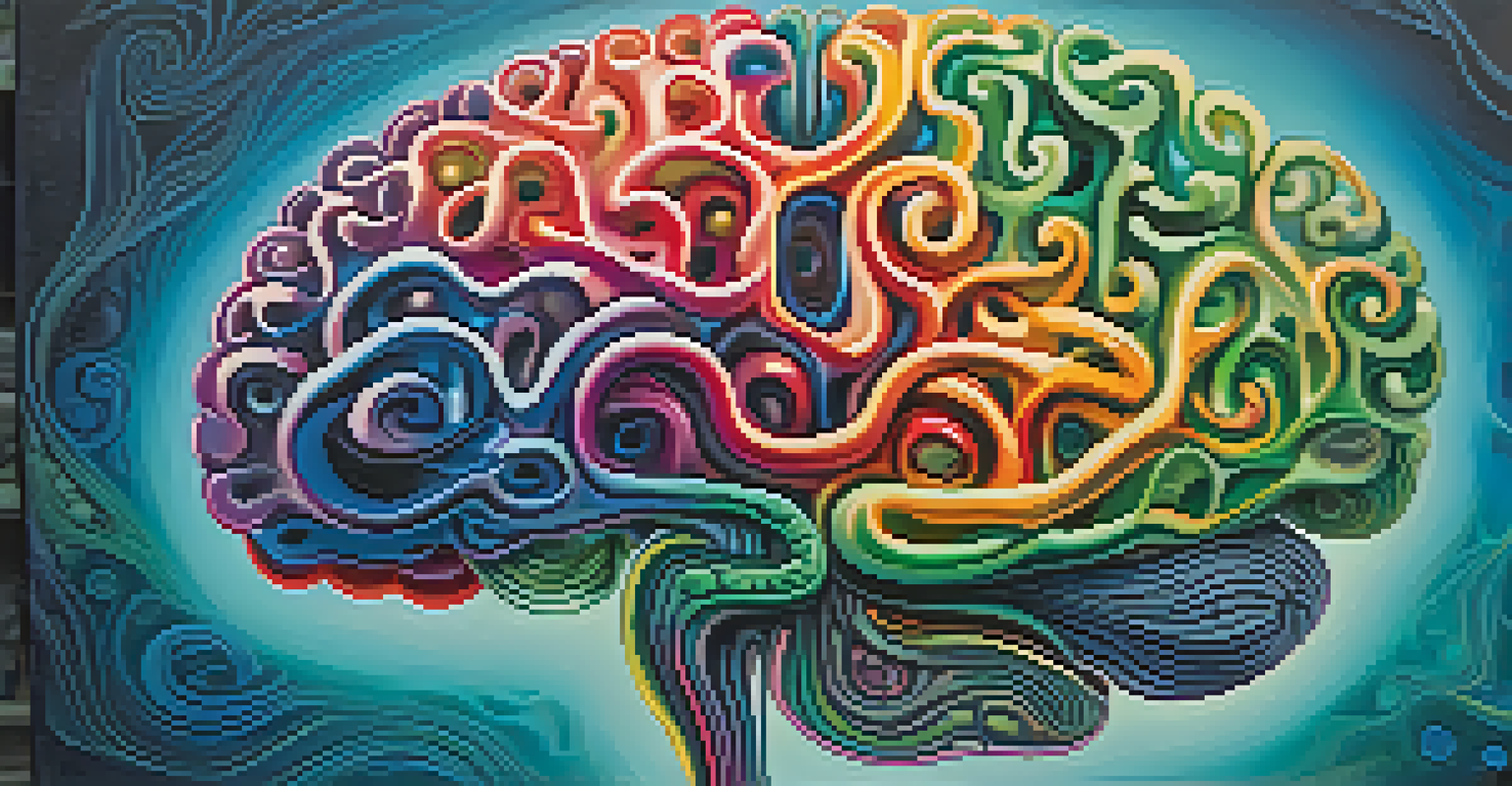Psychedelics in Therapy: A New Frontier for Mental Health

Understanding Psychedelics and Their Therapeutic Potential
Psychedelics, such as psilocybin and MDMA, are substances that alter perception and mood. Historically, these compounds have been associated with counterculture and recreational use, but recent studies have uncovered their potential therapeutic benefits. By enabling profound psychological experiences, psychedelics may help individuals confront trauma and anxiety in ways traditional therapies struggle to achieve.
Psychedelics can help individuals confront trauma and anxiety in ways traditional therapies struggle to achieve.
Research indicates that psychedelics can foster neuroplasticity, allowing the brain to form new connections and pathways. This is particularly valuable for treating conditions like PTSD and depression, where rigid thought patterns often trap individuals. By breaking these cycles, psychedelics can open the door to healing and personal growth.
Moreover, the growing body of evidence supporting their efficacy has led to a shift in public perception. As stigma surrounding these substances diminishes, the conversation about their role in mental health therapy is gaining momentum, paving the way for more research and clinical trials.
The Science Behind Psychedelics and Mental Health
At the core of psychedelic therapy lies the principle of altered states of consciousness. When individuals consume psychedelics in a controlled environment, they often experience deep introspection and emotional release. This process can facilitate breakthroughs in understanding personal challenges, making it easier to address underlying issues.

Studies have shown that psychedelics can boost serotonin levels, which play a critical role in mood regulation. For someone battling depression, this can lead to significant improvements in symptoms, sometimes after just one session. The compounded effects of these substances can offer long-lasting relief, unlike many conventional medications that require ongoing use.
Psychedelics Aid Mental Health
Research shows psychedelics like psilocybin and MDMA can help treat conditions such as PTSD and depression by fostering neuroplasticity and enabling emotional breakthroughs.
Additionally, the therapeutic setting, often involving trained guides, enhances the experience. This supportive environment allows individuals to navigate their emotional landscape safely, fostering a sense of trust and security that is crucial for effective therapy.
Psychedelic-Assisted Therapy: What to Expect
Psychedelic-assisted therapy typically involves a few stages: preparation, the experience itself, and integration. In the preparation phase, therapists help clients set intentions and understand what to expect, making the journey feel more manageable. This initial guidance is essential in creating a safe mental space for the upcoming experience.
The integration of psychedelics into therapeutic practices could lead to a paradigm shift in mental health care.
During the actual psychedelic experience, clients are often encouraged to lie down, wear eye masks, and listen to music. This immersive environment helps them delve into their psyche, facilitating emotional exploration. Many report feelings of connection and insight that are hard to articulate, but profoundly impactful.
Following the experience, integration sessions are vital. Here, therapists and clients work together to make sense of insights gained during the journey. This reflection helps solidify the therapeutic benefits and encourages lasting change, making the entire process a holistic experience.
Real-Life Success Stories in Psychedelic Therapy
Numerous individuals have shared transformative experiences stemming from psychedelic therapy. For instance, a veteran suffering from PTSD found relief after participating in MDMA therapy, allowing him to confront and process traumatic memories that had haunted him for years. His story is just one of many that highlight the potential of these treatments.
Another example involves a woman battling severe depression who underwent psilocybin therapy. After just one session, she reported a significant reduction in symptoms, feeling a sense of clarity and hope that had eluded her for years. These personal narratives underscore the profound impact psychedelics can have on mental health.
Therapeutic Process is Crucial
Psychedelic-assisted therapy involves preparation, the experience itself, and integration, all of which are essential for fostering lasting change and understanding personal insights.
While these stories are inspiring, they also remind us of the importance of responsible use and professional guidance. Each journey is unique, and what works for one person may not resonate with another, emphasizing the need for tailored therapeutic approaches.
Challenges and Ethical Considerations in Psychedelic Therapy
Despite the promising potential of psychedelics in therapy, there are challenges to address. The legal status of these substances varies widely, with many still classified as illegal in numerous jurisdictions. This legal ambiguity can hinder research and limit access for those who may benefit.
Additionally, the therapeutic environment must be approached with care. Not all individuals are suitable candidates for psychedelic therapy; factors such as personal history and mental health conditions need to be considered. A thorough screening process is crucial to ensure safety and efficacy for participants.
Finally, ethical considerations around informed consent and the potential for misuse must be addressed. As interest in psychedelics grows, it is essential to establish clear guidelines to protect individuals and maintain the integrity of therapeutic practices.
The Future of Psychedelics in Mental Health Treatment
The future of psychedelics in therapy looks promising, with ongoing research and clinical trials expanding our understanding. As more studies demonstrate their efficacy, we may see a shift in how mental health conditions are treated, integrating psychedelics alongside traditional therapies. This holistic approach could revolutionize treatment options for many.
Moreover, with increased public interest and advocacy, we may see changes in legislation that allow greater access to these therapies. As society moves toward a more open-minded perspective on mental health treatment, the potential for psychedelics to play a central role is exciting.
Future Holds Promise for Psychedelics
Ongoing research and changing public perceptions may lead to greater acceptance and integration of psychedelics in mental health treatment.
Ultimately, the integration of psychedelics into therapeutic practices could lead to a paradigm shift in mental health care. By embracing innovative approaches, we can better serve individuals seeking healing and transformation on their mental health journeys.
How to Get Involved in the Psychedelic Therapy Movement
If you're interested in the psychedelic therapy movement, there are various ways to get involved. One option is to educate yourself through reputable sources, including books, documentaries, and research articles that delve into the topic. Understanding the science and experiences behind psychedelics can empower you to engage in informed conversations.
You might also consider participating in workshops or events focused on psychedelic therapy. These gatherings often provide valuable insights from experts and personal stories from individuals who have undergone therapy. Connecting with like-minded individuals can foster community and support your journey of exploration.

Finally, advocating for responsible research and legalization can contribute to the broader acceptance of psychedelics in mental health treatment. Whether through supporting organizations, signing petitions, or simply sharing your knowledge, every action helps shape the future of this promising field.